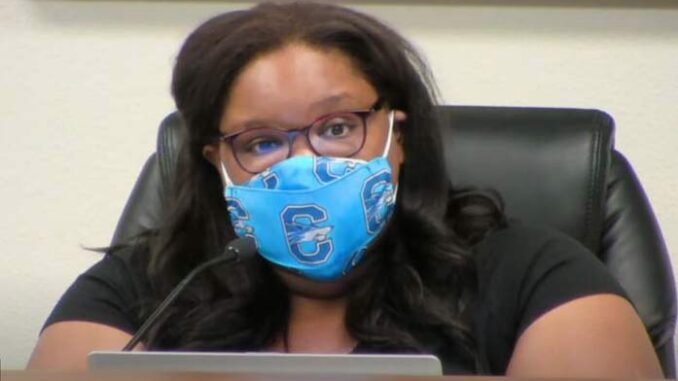
by Corinne Murdock | Dec 1, 2021 | News
By Corinne Murdock |
On Tuesday, a federal court issued a preliminary injunction against President Joe Biden’s COVID-19 Centers for Medicare and Medicaid Services (CMS) vaccine mandate for health care workers. Arizona health care workers under CMS jurisdiction via Medicare and Medicaid programs don’t have to adhere to the vaccine mandate. Louisiana Western District Judge Terry Doughty, an appointee of previous President Donald Trump, issued the order.
Arizona Attorney General Mark Brnovich announced the injunction Tuesday afternoon.
“NATIONWIDE INJUNCTION Great news – a federal judge just granted our coalition’s request to STOP the Biden Administration’s overreaching ‘job or jab’ COVID-19 vaccine mandate for health care workers. We will continue to take action to protect Arizona’s health care heroes,” wrote Brnovich.
Brnovich joined a coalition of 13 other states led by Louisiana Attorney General Jeff Landry, a Republican, in response to an emergency order issued by CMS on November 4. Under the CMS mandate, health care workers would’ve had to be fully vaccinated by January 4. That would’ve required individuals receiving vaccines requiring two doses to receive their first injection by December 6 to be fully compliant.
In a memorandum, Doughty wrote that Biden’s attempt to bypass Congress posed a grave threat to our Constitutional order. He emphasized the importance of safeguarding American liberties more so during the pandemic than at any other time.
“If the separation of powers meant anything to the Constitutional framers, it meant that the three necessary ingredients to deprive a person of liberty or property – the power to make rules, to enforce them, and to judge their violations – could never fall into the same hands,” wrote Doughty. “The executive branch is allowed to usurp the power of the legislative branch to make laws, two of the three powers conferred by our Constitution would be in the same hands. If human nature and history teach anything, it is that civil liberties face grave risks when governments proclaim indefinite states of emergency.”
Although Press Secretary Jen Psaki issued a statement on Tuesday emphasizing the importance of vaccinations to combating COVID-19 and the latest variant, Omicron, she didn’t address the ruling as of press time.
Neither did President Joe Biden. Instead, Biden’s remarks for most of Tuesday concerned bills his administration worked to pass such as the infrastructure law, with the school shooting in Oxford, Michigan occupying the remainder of that day.
Reuters noted in their coverage that the White House declined to comment on these legal losses.
This is the latest in a series of legal battles over COVID-19 vaccine mandates that the president has lost. Courts also temporarily halted the federal contractor vaccine mandate, as well as a rule through the Occupational Health and Safety Administration (OSHA) requiring businesses with 100 or more employees to either be vaccinated or tested weekly.
Kentucky Eastern District Judge Gregory Van Tatenhove, a Bush appointee, also issued his order halting the Biden Administration’s requirement that new government contracts require contractor employees to be vaccinated for COVID-19 on Tuesday. Tatenhove’s rationale for imposing the injunction was similar to Doughty’s, citing “serious Constitutional concerns.” Tatenhove didn’t dispute that the COVID-19 vaccine worked, or that the federal government could mandate vaccinations within certain circumstances. Rather, Tatenhove said that the legal question at hand concerned what authorities the president and federal government had.
“Can the president use congressionally delegated authority to manage the federal procurement of goods and services to impose vaccines on the employees of federal contractors and subcontractors? In all likelihood, the answer to that question is no,” wrote Tatenhove. “[T]here is a serious concern that Defendants have stepped into an area traditionally reserved to the States, and this provides an additional reason to temporarily enjoin the vaccine mandate.”
Read Doughty’s full opinion ordering an injunction against the CMS mandate here.
Corinne Murdock is a reporter for AZ Free News. Follow her latest on Twitter, or email tips to corinne@azfreenews.com.

by Terri Jo Neff | Nov 30, 2021 | News
By Terri Jo Neff |
While President Joe Biden continues to ignore pleas from Arizona’s sheriffs to take back control of the southern border, one top federal law enforcement official in Arizona is revealing the true nature of the border crisis, one social media posting at a time.
John R. Modlin is the Chief Patrol Agent of the U.S. Border Patrol’s Tucson Sector and its 3,600 employees assigned to cover Cochise, Pima, and Santa Cruz counties. His frequent use of Twitter features significant arrests and apprehensions by his agents, while also highlighting efforts by local USBP to keep local residents and the country safe.
On Tuesday, Modlin announced that agents with the USBP Brian A. Terry Station in Cochise County arrested Jesus Tafolla-Beana near Naco. Records show Tafolla-Beana, a Mexican citizen, was previously convicted in Utah of felony unlawful sexual activity with a minor and then deported. As a result, Tafolla-Beana was unlawfully in the United States when taken into custody.
Cochise County Sheriff Mark Dannels told AZ Free News that USBP’s arrest of Tafolia Beana illustrates the continued dangers of an unsecure border. It is a concern Dannels and other border sheriffs have spoken about since Biden took office, particularly after he nominated Alejandro Mayorkas to be Secretary of the U.S. Department of Homeland Security.
“A secure border promotes safe communities and their quality of life,” Dannels said. “Border security shall never be discretionary, but a mandate by all elected officials, local, state and federal.”
Unfortunately, local and state law enforcement leaders have had little success getting the Biden Administration to engage in constructive discussions about the border or to even admit there is criminal activity occurring at the border. Modlin’s social media efforts are seen as a realistic, albeit small, glimpse of what is really happening.
“Beana is just another example of the aggravated criminals breaching our southern border,” Dannels said. “I applaud our Border Patrol agents for all they do in protecting our borders during a time where historical intrusions are challenging their efforts.”
Modlin’s disclosure about Tafolla-Beana’s arrest came about 24 hours after he shared a photograph of 166 undocumented migrants apprehended in a remote area west of Sasabe by agents with the USBP Three Points Station. More than 70 minors were in the group, Modlin noted.
Earlier this month, journalist Terence Jeffrey reported in The Daily Signal that from February to October of this year, 23 undocumented migrants with prior homicide convictions have been taken into custody in Arizona. The 23 have since been charged in U.S. District Court with the federal crime of illegally reentering the United States after deportation.
The uncontrolled border situation recently prompted the Western States Sheriffs’ Association to issue a statement of No Confidence in Mayorkas’ leadership.
The group, which represents sheriffs in 17 states, called on the President to take immediate steps to remove Mayorkas. The statement also noted there already has been more than one million illegal border crossings this year, with “hundreds of thousands of illegal immigrants” who local authorities know were not intercepted by federal law enforcement at the border.
“After witnessing this disaster over the past several months and listening to the continued rhetoric and intellectual dishonesty from Secretary Mayorkas, the Western States Sheriffs’ Association and its membership must emphatically state our position of having NO confidence in the ability of Secretary Mayorkas, and his leadership within the Department of Homeland Security, to affect any positive outcome on this matter,” the statement reads.

by Corinne Murdock | Nov 30, 2021 | Education, News
By Corinne Murdock |
Chandler Unified School District (CUSD) Governing Board member Lindsay Love won’t be seeking re-election this coming year. The freshman board member decided one term was enough after what will be four years of escalating tensions between the board and parents. During her tenure, Love was integral to mounting divisiveness and controversy between parents and the board with her advocacy for social justice agendas such as comprehensive sex education and equity initiatives aligned with Critical Race Theory.
In a Halloween interview with 12 News to explain why her first term at CUSD will be her last, Love remarked on the tensions between her and the community. She followed that observation with a comment that she was the first woman of color and Democrat to join the board, though CUSD Board members are presented as nonpartisan.
Love claimed that she arrived as an answer to the “high profile” incidents of racism in CUSD when she ran in 2018. In January of that year, a Snapchat video of San Tan Junior High students chanting a song that included racial slurs circulated. Along with that controversial Snapchat video, CUSD parents alleged that their students were experiencing racist bullying.
Upon Love’s arrival to the board in 2019, her social justice agendas incited controversies of their own. Concerned parents and community members such as Not In Our Schools began documenting Love’s policy approaches – especially her connection to Planned Parenthood. Love’s sister, Chris Love, chairs the board of Planned Parenthood Advocates Arizona, the advocacy arm of Planned Parenthood Arizona.
Love has advocated for more expansive K-12 sex education, pushing back against CUSD’s leading with an abstinence-focused approach. Her sister also disagrees with abstinence. In a profile with Emerge America, Love explained that her sister urged her to run for the CUSD board and emphasized the importance of swapping abstinence-only education for a “comprehensive” sex education.
“Our children deserve medically-accurate and age appropriate comprehensive sex education because abstinence-only education has done little to reduce the teen pregnancy rate in Arizona which is higher than the national average,” said Love.
Love has received help from her sister in other ways. During a board meeting last January, her sister led a group that shouted down the board for not allowing more public comment on the topic of revising sex education.
The Love sisters are similar in many regards, including their predilection for embracing controversy. Chris Love made light of her use of dismembered baby doll parts for her “spooky” Christmas tree. She later tweeted that she appreciated the work of the Texas Satanic Temple for their activism to reverse Texas’s abortion law.
“A tribute to the other Love sister – Courtney Love – or the anti-abortion trolls. You pick. Still, these are getting spooked up and placed on the Halloween tree! I’ll write the headline for you. ‘Chandler School Board member dismembers Black babies for Satanic abortion tree,’” wrote Chris. “The white dolls will be ready tomorrow. I’m equal opportunity for #SpookySzn.”
“Before the antis get their panties in a bunch, I absolutely appreciate the abortion rights work of @satanic_temple_ . Have y’all even seen my #TrickOrTree?” wrote Chris.
Even with parental pushback on certain subjects, Lindsay Love has consistently doubled down throughout her tenure. In terms of her equity initiatives harmonious with Critical Race Theory concepts, Love has insisted that schools have been “built off of white supremacy” and that not seeing students for their color harms students. She’s also supported efforts to have teachers acknowledge their “unconscious bias” while students explore their racial and ethnic identities.
In an argument for a revised history that would offer a purportedly more accurate account of the harms done to minorities and oppressed groups, Love claimed that Critical Race Theory isn’t being taught in schools and that the concern for it was manufactured by parents wanting to protect white children.
“These school board meeting takeovers are manufactured by people who are afraid of the impact of our full and accurate history on white children,” wrote Love.
A little over a year ago, Love deleted a controversial Twitter account after tweeting that good manners were white supremacy.
“Hey guys! Politeness is white supremacy. Every time you prioritize politeness and civility over everything in a conversation, you are complicit in upholding white supremacy. All that to say, DISRUPT,” wrote Love.
As reported by Arizona Daily Independent, Love also likened conservative black radio host James T. Harris to a “house slave” and insisted he suffered from “Post Traumatic Slave Syndrome” for his differing political views. These remarks also appeared in the “Community Love” group.
Amid the surge of parent demands for curriculum reform and transparency, as well as ending mask mandates, Love shared a controversial Politico opinion piece in September titled, “The Dangerous Legal Illusion of ‘Parental Rights.’” Love posted that in her community group page for CUSD community members and affiliates, “Community Love.” In her post, Love quoted the following from the opinion piece:
“When it comes to society’s interest in protecting children, the legal precedent is unambiguous: The rights of their parents come second. Parents do have the freedom to direct the health care and education of their children, but these rights are not unlimited. As the Supreme Court said in Prince v. Massachusetts, parents are not free ‘to make martyrs of their children’ by putting them in harm’s way. Governments can and do limit parents’ discretion with the goal of protecting the health, safety and welfare of children. One example is child car seat requirements, which exist in all 50 states. Every state also has a law authorizing the government to intervene when parents abuse or neglect their children.
All 50 states also have the power to limit parental discretion to protect other children. For instance, schools and day care facilities are heavily regulated by local, state and federal laws to make sure that they are safe. Children who attend school are required to be immunized in all 50 states. These requirements have been upheld by numerous courts, including the Supreme Court. Schools also prohibit parents from sending children to school when they are sick, and a federal appeals court held that unimmunized children could be excluded from school during “an outbreak of a vaccine-preventable disease.” Given these legal precedents, it is clear that schools and day care facilities can require masks as a condition of attendance.” (emphasis added)
Love’s approach to governance hasn’t been complemented by the district’s efforts, either. CUSD made national news last month after it was discovered that the district coordinated with Chandler Police Department (CPD) to surveil and act against parents who protested masking requirements.
Love’s decision to leave after only one term is unusual. Former Arizona Superintendent Diane Douglas told AZ Free News that she’s observed many school board members staying on for three or more terms, because the first term is more of a learning curve.
“The first term is generally a learning curve. It needs to be a pretty quick one. At eight years you really hit your stride and get good at understanding. After twelve years – anyone that stays any longer it becomes more about the person than the community. It’s really for the wrong reasons after that,” stated Douglas.
Douglas added that she hopes Love’s replacement would better represent constituent interests.
“I would hope that the community would consider candidates that would be more reflective of the community itself. It doesn’t seem like she has been,” remarked Douglas.
Corinne Murdock is a reporter for AZ Free News. Follow her latest on Twitter, or email tips to corinne@azfreenews.com.

by Corinne Murdock | Nov 30, 2021 | Education, News
By Corinne Murdock |
Arizona State University (ASU) told AZ Free News that it doesn’t have anything to say about Wednesday’s student-led protest against Kyle Rittenhouse’s prospective enrollment to the university. Four student organizations that advocate for socialism and other social justice causes coordinated the protest: Students For Socialism (SFS), Movimiento Estudiantil Chicanx de Aztlán (MEChA), Students for Justice in Palestine (SJP), and the Multicultural Solidarity Coalition (MSC). The following is the only statement ASU spokespersons had concerning Rittenhouse:
“Kyle Rittenhouse has not gone through the ASU admissions process. University records show that he is not currently enrolled in any classes at ASU.”
The ASU newspaper, State Press, confirmed earlier this week with ASU spokespersons that Rittenhouse isn’t enrolled currently because Rittenhouse took a “compassionate withdrawal” ahead of his trial. ASU spokesman Jay Thorne also clarified that ASU doesn’t ask for prospective students’ criminal history during the admissions process.
ASU President Michael Crow clarified in an alternative, slightly lengthier statement to State Senator Kelly Townsend (R-Mesa) that Rittenhouse voluntarily unenrolled, and ASU would consider Rittenhouse’s application with the same consideration granted to any other applicant should he decide to reenroll.
“Kyle Rittenhouse did not go through the ASU admissions process, but was enrolled in two publicly available courses for this semester. University records show that he is now no longer enrolled, a status precipitated by his own actions,” wrote Crow. “As a university that measures itself by whom it includes and how they succeed, should he choose to seek admission in the future, his application will be processed as any other would be.”
The student organizations said it didn’t matter to them that Rittenhouse wasn’t enrolled currently – the fact that he planned to enroll again in the spring was still problematic.
“While students with debilitating medical problems or going through mental health crises must fight tooth and nail for medical leave of absence, Rittenhouse is given ‘compassionate’ withdrawal to deal with his murder trial – unacceptable,” tweeted SFS in back-to-back tweets sharing the State Press coverage. “We will not allow it! Killer Kyle off our campus!”
In an interview with The Conservative Circus, ASU College Republicans United (CRU) State Chair Ren Ramsey insisted that the behavior of the four student organizations was harassment.
“[T]he fact that these radical, domestic extremist [student] organizations on campus have created a hostile environment for many students that have conservative or patriotic beliefs,” said Ramsey. “We would like to make a demand that [these organizations] be suspended. They deliberately created a hostile environment for Kyle Rittenhouse. [Campus] was made unsafe for him, for many other conservative students. We want the ASU administration to place them under suspension. They’ve also been involved in pushing out two white kids from the multicultural center for being white.”
Ramsey further claimed that ASU has consistently supported the behaviors and values of the organizations protesting Rittenhouse, and has been hostile to organizations like theirs. He asserted that ASU officials gave MEChA an entire basement area to use, but won’t give CRU a professor to serve as their advisor.
As for the multicultural center incident, Ramsey was citing the September incident in which three female student activists harassed two of their peers out of a common area for being white males displaying “racist” messaging, such as a “Police Lives Matter” sticker. ASU found that the women involved had violated several policies within the university’s Code of Conduct, though it is unclear if any disciplinary action has been taken yet.
The student organizations aren’t only protesting the potential admission of Rittenhouse – they’re also making demands of ASU. The groups insisted that ASU rectify Rittenhouse’s past and potential future presence on campus by funding the Multicultural Center and a Campus Assault Advocacy, Resources & Education (CAARE) Center, a rape crisis center helping sexual and domestic assault victims. ASU wouldn’t comment on these demands, either.
“It’s good to see he knows he’s not welcome here, we’ll still be there Wednesday to tell administration to support our other demands,” said the organization. “Denounce white supremacy, fund the Multicultural Center and the CAARE center!”
Rosenbaum was a convicted child molestor, and Huber was a convicted domestic abuser. In their statements, the coalition of student organizations only referred to the deceased men as “anti-racist protestors” and victims.
Court proceedings revealed that Rosenbaum wasn’t at the Kenosha, Wisconsin riots to protest for Black Lives Matter (BLM) or anti-racism. Rather, Rosenbaum happened to be discharged that day from a mental hospital for a suicide attempt; Rosenbaum threw a hospital-provided plastic toiletries bag at Rittenhouse just before the fatal moment when he grabbed the barrel of Rittenhouse’s gun.
The claimed “anti-racist” was also heard by eyewitnesses and recorded as having shouted repeatedly a racial slur: “Shoot me n***a!”
AZ Free News asked SFS why they and their coalition of fellow student organizations chose to use their Rittenhouse protest to demand funds for a CAARE center, considering the criminal histories of Rosenbaum and Huber. SFS responded that Rosenbaum and Huber could have been anyone.
“Did Rittenhouse run a background check on Rosenbaum before? Are you saying he premeditated the murder? No, he didn’t. It could have been anyone. Period,” responded SFS.
We attempted to follow up further with SFS on their response and our other, unanswered question. They didn’t respond by press time.
Another similar effort to bar Rittenhouse from attending ASU – a Change.org petition unaffiliated with the student organizations’ efforts – has garnered around 13,000 signatures as of press time.
Corinne Murdock is a reporter for AZ Free News. Follow her latest on Twitter, or email tips to corinne@azfreenews.com.

by Corinne Murdock | Nov 29, 2021 | News
By Corinne Murdock |
The former director of the Arizona Department of Health (ADHS), Will Humble, issued a statement on Sunday noting that Arizona’s number of COVID-19 deaths in children was 250 percent above the national average. Humble pulled the statistic from the ADHS Child Fatality Review Program (CFRP) annual report on child fatalities in 2020, released earlier this month. The exact number of children who reportedly died from a COVID-19 infection amounted to twelve. There were 29 indirect COVID-19 deaths, accounting for the majority of listed child COVID-19 deaths.
Those 29 deaths weren’t caused by a COVID-19 infection. Rather, they were caused by circumstances CFRP insisted were set up by the COVID-19 pandemic at large; in other words, the pandemic resulted in a butterfly effect that led to a majority of these children’s deaths. ADHS noted that they were “among the first in the nation” to adopt this rationale for cataloguing COVID-19 deaths. That may explain the disparity between Arizona’s purported number of child COVID-19 deaths versus the national number.
The CFRP report classified those butterfly effect majority deaths, “indirect COVID-19 deaths.” They claimed that children didn’t have to be infected with COVID-19 to have died from it.
“An indirect COVID-19 death is a death where the child or caregiver experienced changes or disruptions in how they lived, worked, or accessed services due to COVID-19,” stated the report. “The CFRP recognizes that COVID-19 likely is indirectly related to other increases of child deaths in particular suicide, firearm injuries and motor vehicle crashes included in this report.”
The ADHS report further admitted that researchers reviewed case files of other child deaths that occurred prior to public knowledge of the pandemic to discern whether those deaths were directly or indirectly related to COVID-19. For suspected direct deaths, researchers relied on medical record classifications such as influenza and pneumonia to determine whether the child died from COVID-19 and not the cause of death assigned originally. For suspected indirect deaths, researchers admitted that they considered the following:
“Indirect COVID-19 deaths may include (but is not limited to): looking at deaths that occurred during school closures when the child may not have died if they were physically in school, deaths where the fear of contracting COVID-19 impacted seeking medical care, and social (isolation, lack of supervision, etc.), emotional (mental health, fear of contracting COVID-19, etc.), or economic changes (finance disruptions, lack of childcare, etc.) induced by COVID-19 which may have impacted the child’s or parent’s decision-making and overall wellbeing leading to the child’s death,” asserted the report.
Even with the inclusion of deaths unrelated to COVID-19 infection, ADHS noted that the total child COVID-19 deaths totaled less than 1 per 100,000 last year.
Of the twelve who died from COVID-19 directly: seven were due to poverty and six lived in a rural region. Exact numbers couldn’t be provided for the number of children who had a chronic medical condition, no insurance, and/or an inflammatory syndrome because they numbered less than six.
According to ADHS, there have been a total of 50 individuals under the age of 20 whose cause of death could be attributed to COVID-19. ADHS catalogued deaths by age group; the deaths for those under 20 years old were so low in comparison to the other deaths that the ADHS tracker quantified it as less than one percent of all COVID-19 deaths.
Just under 1,200 total deaths for those aged 20-44, just over 1,700 deaths for those aged 45-54, well over 3,400 deaths for those aged 55-64, and over 15,800 for those over 65.
Currently, Humble serves as the director of the Arizona Public Health Association (AZPHA), a health lobbying organization affiliated with the national lobbying organization, American Public Health Association (APHA).
Corinne Murdock is a reporter for AZ Free News. Follow her latest on Twitter, or email tips to corinne@azfreenews.com.

by Corinne Murdock | Nov 29, 2021 | Education, News
By Corinne Murdock |
Arizona State University (ASU) student organizations advocating for issues like socialism, antiracism, and social justice are demanding the expulsion of Kyle Rittenhouse, effectively a campaign to cancel him. Rittenhouse had enrolled in an online ASU course in October; following his acquittal of all charges earlier this month, Rittenhouse announced that he hoped to enroll fully at ASU. Arizona Daily Independent listed all the groups involved in the campaign against Rittenhouse: Students for Socialism, Movimiento Estudiantil Chicanx de Aztlán (MEChA), Students for Justice in Palestine, and the Multicultural Solidarity Coalition (MSC).
The student organizations accused Rittenhouse of “white supremacy” and being a “racist murderer.” A jury determined otherwise. Several weeks ago, Rittenhouse was acquitted of multiple charges of homicide and reckless endangerment. Rittenhouse killed two of his assailants – Joseph Rosenbaum and Anthony Huber – and wounded a third, Gaige Grosskreutz. The trial revealed that the three men pursued and attacked Rittenhouse, who was in Kenosha to administer first aid and protect local businesses.
The student activist group petition to expel Rittenhouse also demanded that ASU reaffirm their support for the controversial multicultural center on campus by divesting funds from the ASU Police Department to fund the center and establishing an on-campus rape crisis hub called the Campus Assault Advocacy, Resources & Education (CAARE) Center.
Rosenbaum was a violent, convicted sex offender who served 10 years for multiple counts of child molestation. Huber was a convicted domestic abuser.
As AZ Free News reported, MSC leaders were behind the incident in September in which they demanded two of their peers leave a room on campus for being white males who were displaying “racist” messaging, such as a “Police Lives Matter” sticker. The room wasn’t designated officially as a multicultural room at the time of the incident.
Earlier this month, ASU determined that the three women involved – Sarra Tekola, Miriam “Mimi” Arraya, and Mastaani Qureshi – violated the university’s Code of Conduct.
Tekola and Arraya are prominent leaders within the Phoenix Metro chapter of Black Lives Matter (BLM). Tekola co-founded the chapter, and Arraya served as a policy minister. The pair’s BLM chapter has come to the defense of the three women for harassing and discriminating against their peers. They hosted a press conference earlier this month, and called for the public to contact ASU officials to drop the Code of Conduct charges against the three women.
BLM Phoenix Metro has also supported a Change.org petition to expel Rittenhouse, similar but separate to the student organizations’ efforts.
The ASU student behind the petition is Taskina Bhuiyan, a sophomore studying microbiology. Bhuiyan’s petition characterized Rosenbaum, Huber, and Grosskreutz as “victims.” As of press time, the petition has over 1,200 signatures.
According to Bhuiyan’s LinkedIn, she worked for Living United for Change in Arizona (LUCHA) from 2018 to 2020 – the controversial activist organization that followed Senator Kyrsten Sinema into the bathroom over her hesitation to support the infrastructure bill. ASU Police recommended misdemeanor charges be filed against the activists. Bhuiyan’s name also appears on the staff page for the Islamic Community Center of Tempe, a mosque.
Demands for Rittenhouse’s expulsion came after ASU College Republicans United (CRU) announced that they were fundraising for lawsuits Rittenhouse may file against the media, if any. Previously, ASU CRU raised $14,000 for Rittenhouse’s legal defense for his trial.
CRU denounced efforts to cancel Rittenhouse, insisting that ASU should suspend the organizations and individuals involved for engaging in a “harassment campaign.”
Corinne Murdock is a reporter for AZ Free News. Follow her latest on Twitter, or email tips to corinne@azfreenews.com.






